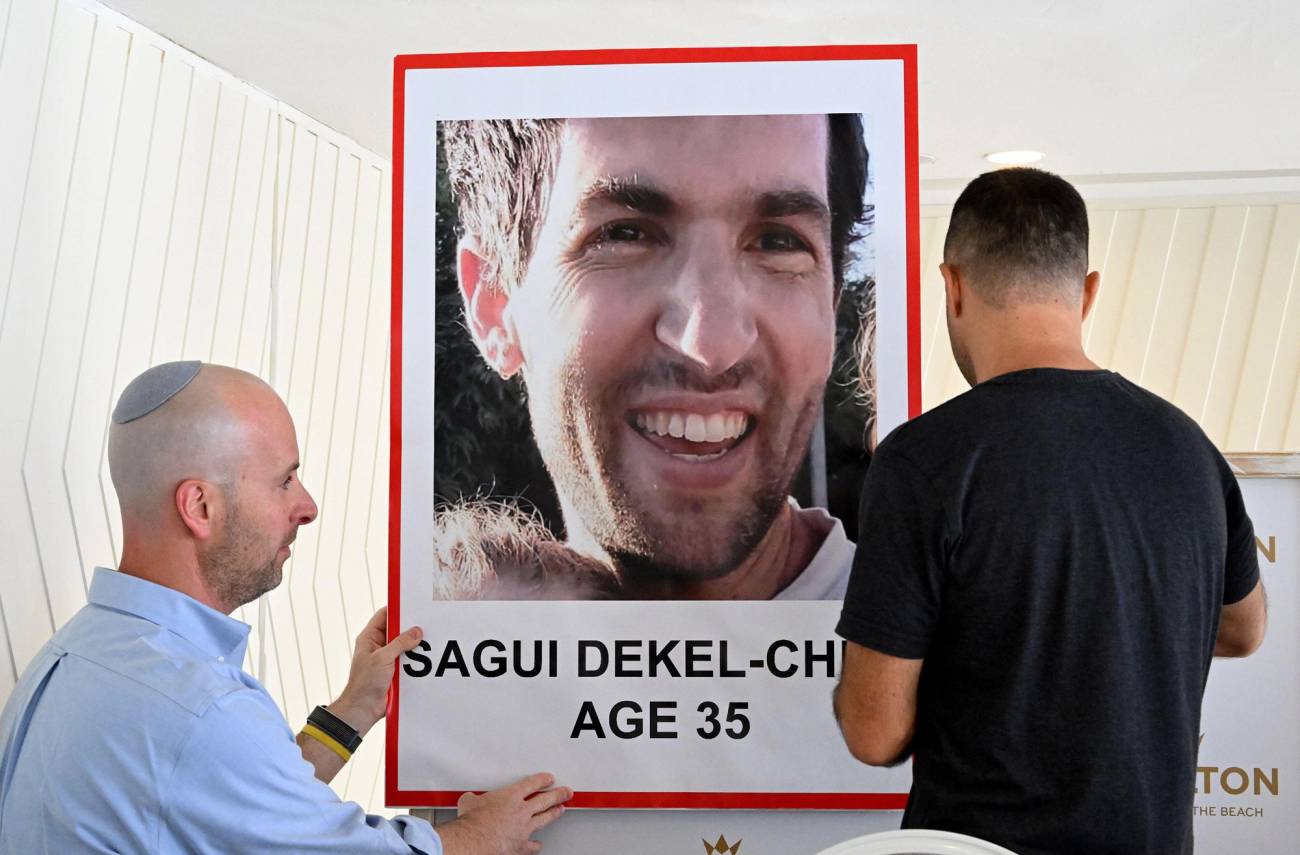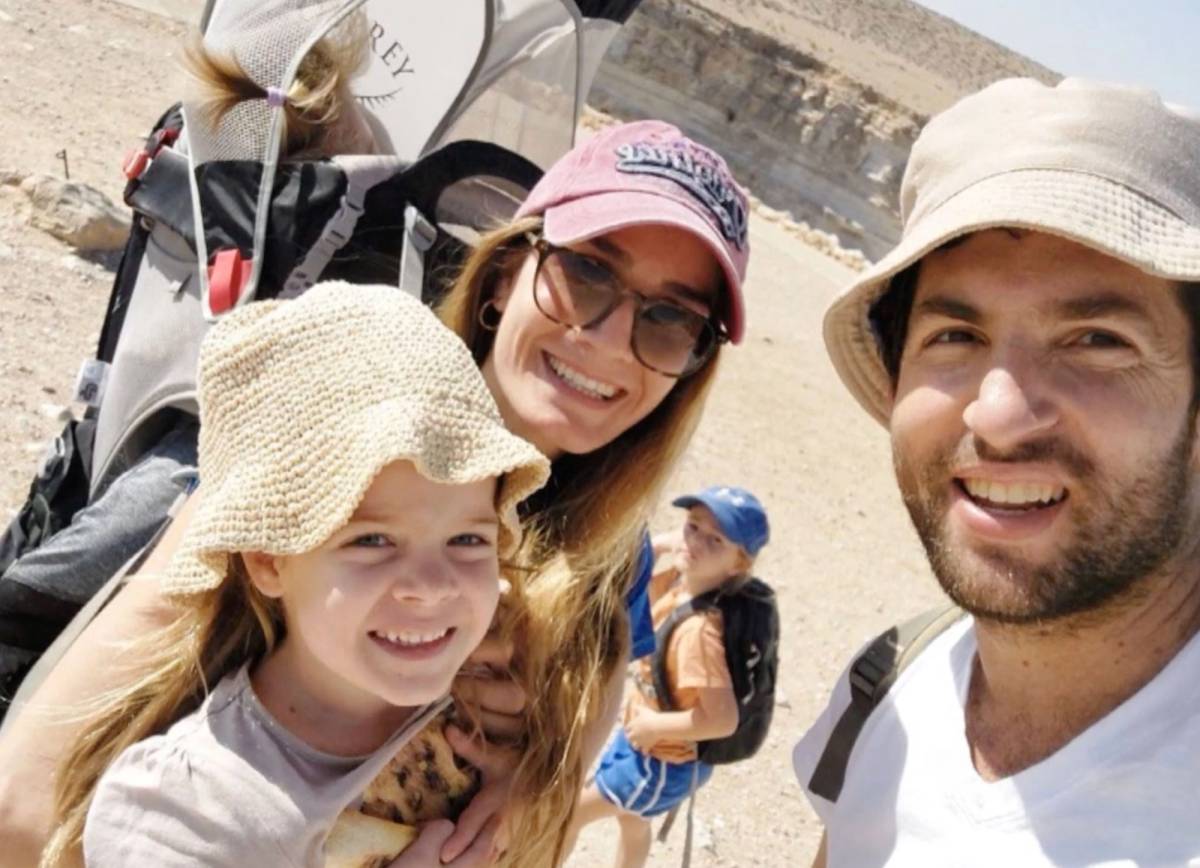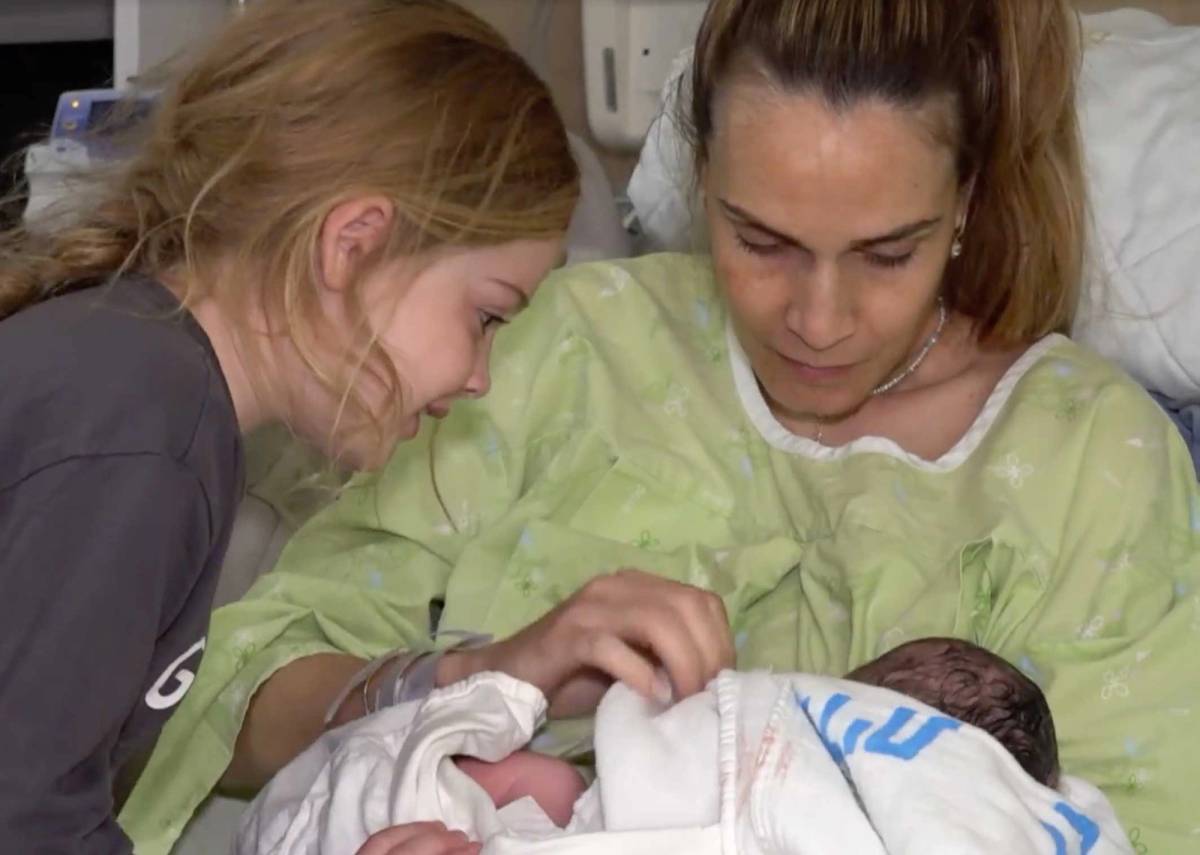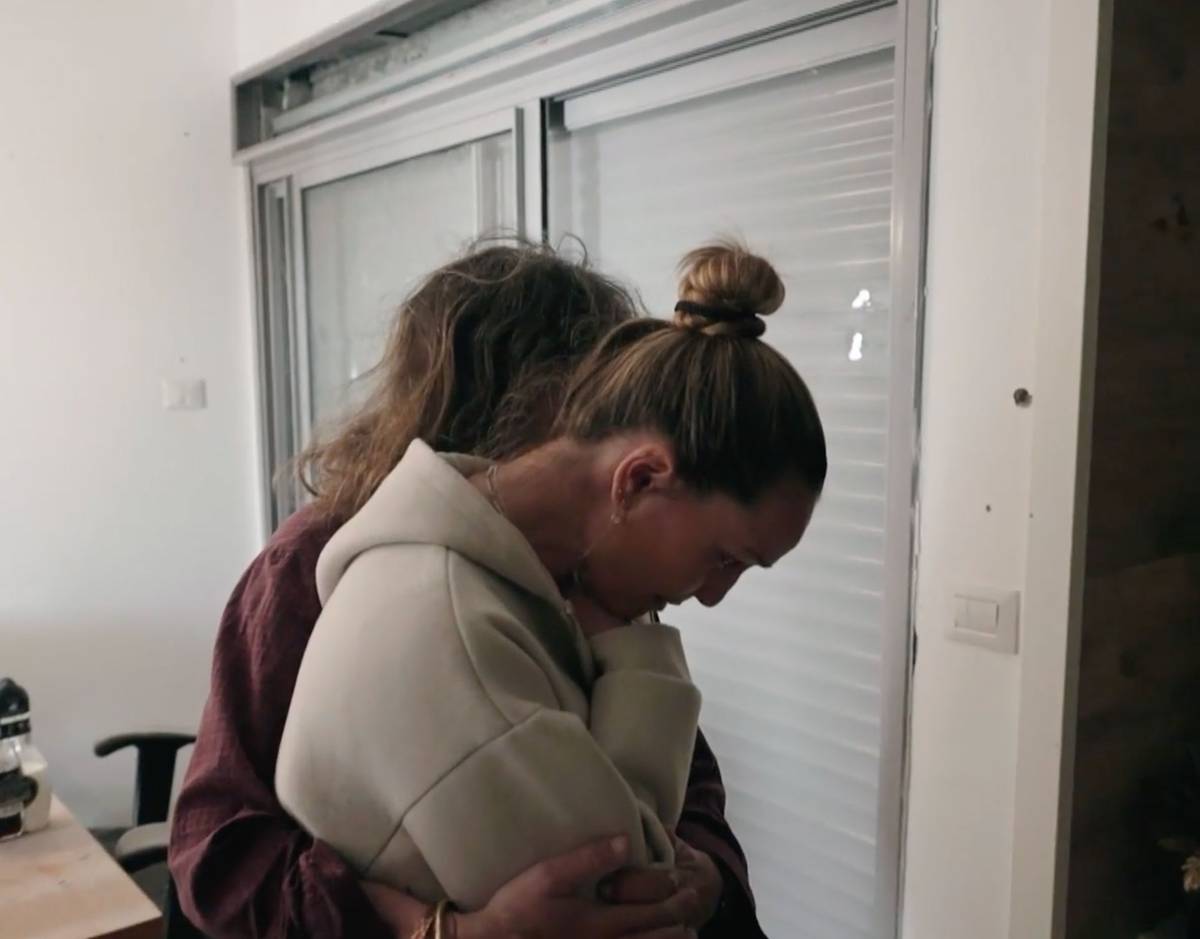A Life Held Hostage
Sagui Dekel-Chen was taken by Hamas from Kibbutz Nir Oz on Oct. 7. Without him, a family, a community, a country, is incomplete.

Debbie Hill/UPI/Alamy

Debbie Hill/UPI/Alamy

Debbie Hill/UPI/Alamy
In August 2015, at the height of summer, we arrived in Israel to paint a performing arts school. Bikurim, also known as the Village, was established the previous year in the Eshkol region of Israel, minutes from Gaza. The residential school was founded to give talented young musicians opportunities for excellence close to home. Before the Village, budding musical artists from southern Israel had to travel long distances to Tel Aviv or Jerusalem. Now, they could receive a world-class education in the country’s breadbasket.
The Village was first conceived in 2010; with hard work and some help from the Jewish National Fund UK, it became a reality. The school acquired a building, an abandoned regional boarding school. They recruited a director, Tamar Kedem-Siman Tov. An idea had come to life.
This was my first time in such a remote place—I grew up in and had lived up to this point in London—and a far cry from the familiarity of Israel’s major population centers. In the Negev, if you want something done, you build it yourself. Sagui Dekel-Chen, son of the Village’s co-founder Jonathan Dekel-Chen, had done just that, renovating the first site for the school, working with his hands, shortly after finishing his service in the Israeli army. Sagui was raised just 10 minutes’ drive away, in the “paradise in the desert” of Kibbutz Nir Oz, a wealth-sharing community where the family had lived since 1990.

Keshet News screenshot
Some classrooms and dormitories at the Village needed to be painted, and here we were, myself and two friends, the painters. Seventeen, with no experience doing things with our hands, with poor Hebrew and a love of music, we picked up some brushes and tape. Sagui, our guide at the Village, showed us the way, making a tough (for us) job simple, rewarding, and fun. I never knew people could be so content just doing things with their hands. We filmed silly videos singing and dancing with our paintbrushes. We didn’t need to see museums, wartime ruins, or even religious sites. The Negev, arid and empty when viewed from above by satellite, was, on the ground, alive with potential to be fulfilled.
We decided—along with the spirited teens we befriended there, working at the Village as part of their national service—to record a music video to raise money. We played and sang “Hallelujah” in Leonard Cohen’s “myth home,” as he once described the country on a visit with Israeli musicians to the not-too-far-away Sinai Desert, during the Yom Kippur War. I understood the phrase “to live as a free people in our land,” from Israel’s national anthem. This was what it felt like.
We raised a modest amount of money for the Village with our music video. But as often goes for diaspora travelers volunteering for Israel, the Village did far more for us than we did for the Village. Watching Sagui work was a marvel. He got up every morning and dedicated himself to doing, finding a solution to each challenge that came his way by thinking outside of the box. Nothing was impossible. The goal in mind was the flourishing of the Jewish people. The Village, one of many successful projects he contributed to, has since moved to a new location in Ein Gedi, giving hundreds of gifted young Israelis the opportunity to pursue their passions and cultivating professional artists across the entertainment industry, from musicians to actors. “Two-and-a-half miles from Gaza, music is made and the land is worked. They work the land in the day and build things up for themselves. Then they play music at night,” I wrote in my journal. The Israeli south quickly became my symbol of hope. The Israelis who made it their home were indeed mythic creatures, superhuman in my eyes.
This was shattered on Oct. 7, 2023, when Sagui Dekel-Chen was taken hostage by Hamas.
On the morning of the Black Sabbath, as it is known locally, 35-year-old Sagui got up early, kissed his wife and two daughters, and went to the kibbutz machine shop to work on one of his many social entrepreneurial projects, refitting an old municipal bus. He spotted Hamas terrorists infiltrating the kibbutz, climbed onto the roof of the communal dining room, issued the warning, and ran home. His pregnant wife, Avital, was in the bomb shelter with their two young daughters.
He’s not one in a million, he’s one out of 10 million.
“He looked at me and said, ‘If they come in, it’s over,’” Avital would later recall to Israel’s Channel 12. “I’ll do everything I can, OK? But they can’t come in,” Sagui told her, and off he went. He disappeared fighting off Hamas terrorists. On that day, some 80 of the approximately 400 residents of Kibbutz Nir Oz, including Sagui, were taken hostage, and the kibbutz was destroyed.
Siman Tov, the first director of the Village, was murdered along with her three children, husband and mother-in-law, all dear friends of the Dekel-Chens. Siman Tov’s husband and mother-in-law were U.S. and Israeli citizens. They are among the more than 40 members of Nir Oz who were slaughtered by hand and by fire.

Keshet News Screenshot
A kibbutz is marked by its shared spaces, facilitating community. All of these, including the kindergarten Sagui worked on, were barbarically damaged. The kibbutz was immediately unlivable. The survivors, including Sagui’s pregnant wife, his two daughters, and his mother—the latter escaping from a Hamas truck en route to Gaza—were evacuated to a hotel in Eilat. They now live temporarily in apartments in Carmei Gat, 50 minutes’ drive away, surrounded by cranes and concrete, a far cry from the green of their kibbutz.

Keshet News Screenshot
Since Hamas’ takeover of the Gaza Strip in 2007, security in the area, home to dozens of Jewish communities within 7 kilometers (4.3 miles) of the Gaza Strip, had been especially precarious. Indeed, violence loomed since the very establishment of these kibbutzim and villages—for strategic security reasons—in the 1950s, with a brief period of calm between the signing of the Oslo Accords and the First Intifada. When I was there in 2015, a year after Israel’s third war with Hamas, known as Operation Protective Edge, a cease-fire was technically in place, but explosions still rang loud. They rocked the ground beneath us in what felt like earthquakes. A banal occurrence to its residents, it caused us much panic. The campus of the Village shook with dust as we ran to shelter, with Bedouin workers poking fun at our inexperience. (We were told the booms were farther away, from Egypt, not Gaza, and we believed them.) Still, no one ever fathomed that the precarious security situation would turn into a massacre—the single-largest loss of Jewish life since the Holocaust.
Since I found out on Oct. 10 that Sagui had been taken hostage, I have been in a sort of daze. I now live even farther away from Israel, in Washington, D.C. Far enough to delude myself. I only came to terms with reality during my second phone conversation with Jonathan, Sagui’s father. Being on the other end of the phone is too much to take. I can’t even fathom the agony of living it. My life goes on because it can. But it doesn’t go on for the victims of Oct. 7. Their lives are stopped in time. Their lives as they knew them are no more. Speaking to Jonathan, I asked questions as though what happened at Nir Oz was a historical event that had concluded. I was totally wrong, unfathomably wrong. “It’s not that there are unsolved issues—there are no certainties,” Jonathan said. Nir Oz has been decimated, and it seems unlikely it will be built anew. Returning to its ruins en masse feels impossible, but finding a new shared home also seems out of the question, for now.
Sagui met his wife Avital—known affectionately to the kibbutz as Mili after the Israeli actress Mili Avital—at age 14. As a teen, he was on Israel’s junior national baseball team, fueled by his father Jonathan’s “addiction,” as he put it, to the sport. Starting out with the Village, Sagui for years has led various initiatives to contribute to the flourishing of Israel’s south. Often finishing his workday at 11 p.m., he somehow found time to create other impactful social entrepreneurial projects. “It’s a product of his creativity and the skills he acquired since he was a little boy,” his father told me. “He grew up on the kibbutz tagging along at the agricultural machine shop with me. At a very early age, he had a really good skill set, but mostly an innate mechanical understanding, a very orderly mind.”
Sagui’s passion is refitting buses, creating something new out of the discarded. He first turned a disused bus into a mobile home, intending to travel in it as a retreat that could be towed around the country. He bought another bus, then another, then another, creating a series of mobile technological classrooms. In videos shared with Channel 12, Sagui is seen with successive newly purchased buses, playfully telling his wife, “I promise, Mili, that’s the last one, the last one,” he says with his characteristic radiant grin. With his wife, Sagui came up with the idea to refurbish a bus into a mobile grocery store for communities without supermarkets. It ended up serving the remote village of Giv’ot Bar, south of the Bedouin township of Rahat.
The original bus accidentally burned. So, Sagui built another. As his colleague and one of his close friends, Director of JNF UK Israel Yonatan Galon described it to me, “Any project we started where Sagui was in charge, it would be completed.” This is unusual in bureaucracy-laden Israel, where projects are often tied up in the planning stages, never making it to execution. Not Sagui’s projects, said Galon: “Sagui is a doer. An extremely hard worker.” If they didn’t have enough funds to complete a project, Sagui would say, “We will find a new way. We will do it differently.”
“He would always remember to ask me how you were,” my father, who kept in touch with Sagui on missions to Israel with the JNF UK, told me. I pored through photos to look for something with Sagui. My father had plenty of group photos and videos. In one, a group of volunteers are hoisting a tree, a JNF tradition, for a patron to plant. The tree is about to topple over when Sagui steps in. With an unassuming poise he fixes the situation and carries the tree upright, so its roots can be planted.
“He never went to university. He is brilliant. Very, very much an autodidact,” Galon explained. “Whenever we had a project that demanded knowledge in a new field, he got to learn this field.” Developing a boarding school, Sagui had to find a way to build the kitchen. It was designated a public space, which came with endless rules and regulations. So, he mastered the regulations, and became expert enough to consult on the topic.
Galon visits Sagui’s family every two weeks in Carmei Gat. The family has grown, with the arrival of their third child, born with Sagui held hostage in Gaza. Avital’s birth was filmed by Channel 12. Cameras are in her face, but she manages to keep in good spirits. “I can deal with terrorists in my home but not with contractions,” Avital says. You can see in the delivery room there is a presence missing: Sagui.
“I’m not the story. Sagui is the story,” she says. “This baby is here thanks to him. He protected us, so it happens thanks to him … Do you realize that my girls and I could have been hostages sitting in Gaza? It doesn’t make sense, really.” Avital named their child Shahar Mazal, retaining her “belly name” Mazal, luck, chosen by Sagui, and adding Shahar, “dawn,” after Siman Tov’s daughter, murdered by Hamas.
Sagui’s father, Jonathan, is a powerful, eloquent voice, meeting with Congress and the U.N., writing articles and speaking on television and podcasts, advocating for his son, an American citizen. The last he heard of Sagui was in late November and early December, when the first hostages from Nir Oz were released. Some of the traumatized women and children confirmed they had encountered Sagui in the tunnels under Khan Younis. Since then, no news. How does Jonathan know what to do? “There’s no game plan, no handbook, no guidebook,” he told me.
“This is an unprecedented situation. Day by day, week by week, trying to figure out what is the most effective use of time and resources.”
Jonathan is a scholar of Eastern European history at the Hebrew University and the son of a Holocaust death-march survivor and a refugee from Nazi Germany. Some have compared the events of Oct. 7, events Jonathan is in part grateful his parents were not there to witness, to the Holocaust. But as Jonathan notes in Haaretz and elsewhere, the Holocaust was different. The Jewish people did not then have a sovereign home.
Now they do. And we have put all our eggs in one basket, in this sovereign home. As the late Charles Krauthammer wrote, “It is my contention that on Israel—on its existence and survival—hangs the very existence and survival of the Jewish people.”
Israel wasn’t destroyed on Oct. 7, thank God. But parts of it were destroyed, and pieces of the country are now held hostage in Gaza. Without them, the country is incomplete. Sagui Dekel-Chen must come home to meet his new daughter. He must come home to continue work on his buses. As Galon told me: “I know he will come back. He’s not one in a million, he’s one out of 10 million.” Israel has a population of about 10 million. Without Sagui, and without the other 130 hostages still held in Gaza, Israel’s survival, and the survival of the Jewish people, hangs in the balance.
Tamara Berens is a writer from London living in Washington, D.C.